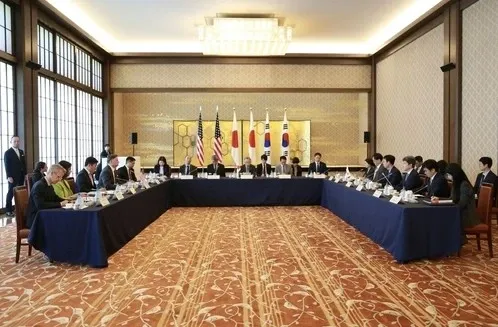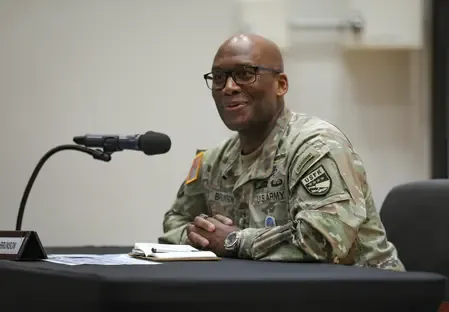How Are South Korea, the US, and Japan Strengthening Deterrence Against North Korea?

Synopsis
Key Takeaways
- Trilateral cooperation is crucial for maintaining peace in the Indo-Pacific.
- Efforts are being made to enhance economic security among South Korea, the US, and Japan.
- Strong deterrent measures against North Korea are a top priority.
- Technological advancements are a focus area for future collaboration.
- Regular dialogues are essential to sustain diplomatic momentum.
Seoul, July 18 (NationPress) In a significant meeting, senior diplomats from South Korea, the United States, and Japan emphasized the critical need to uphold a robust deterrent against North Korea's nuclear threats and expressed their commitment to enhance trilateral cooperation, according to officials from Seoul.
This consensus emerged during a three-way dialogue held in Tokyo, where First Vice Foreign Minister Park Yoon-joo was accompanied by US Deputy Secretary of State Christopher Landau and Japanese counterpart Takehiro Funakoshi, as reported by Yonhap news agency.
This meeting marks the inaugural vice foreign ministerial discussion since the commencement of the Lee Jae Myung administration and the second under Donald Trump's presidency.
According to a statement from South Korea's foreign ministry, the vice foreign ministers underscored the importance of maintaining a strong deterrent against North Korea's nuclear threats through trilateral collaboration, especially in light of the shifting security landscape.
They reached an agreement to continue bolstering trilateral security cooperation founded on solid bilateral alliances and to work diligently on North Korea-related challenges.
During the discussions, Park elaborated on Seoul's initiatives aimed at reducing tensions on the Korean Peninsula and reviving dialogue under the Lee administration, the ministry disclosed.
The dialogue on Friday followed previous discussions that involved Park, US Secretary of State Marco Rubio, and Japanese Foreign Minister Takeshi Iwaya during ASEAN-related foreign ministers' meetings in Malaysia last week.
Reflecting on the Kuala Lumpur meeting, Park highlighted that trilateral cooperation among the three nations is expanding beyond individual sectors to include security, the economy, and technology.
He noted that there is much potential for collaboration in the coming years and that all three countries share the responsibility to translate this potential into real outcomes.
The discussions also encompassed regional developments, with an agreement to persist in efforts to uphold peace and stability in the Indo-Pacific.
Acknowledging economic security as a domain where citizens from the three nations can directly benefit, they concurred on further enhancing practical cooperation in key and emerging technologies, focusing on critical minerals, supply chains, and artificial intelligence.
They noted the advancements in their trilateral partnership, including the establishment of a trilateral secretariat, and agreed to maintain the momentum of this partnership through regular dialogues.
The last vice foreign ministers' meeting took place in Seoul in October of the previous year.
On the sidelines of the trilateral discussions, Park held a one-on-one meeting with Funakoshi to discuss bilateral relations and other pertinent issues, including North Korea.
Park expressed to Funakoshi that South Korea is committed to fostering a strong and mature relationship with Japan, built on mutual respect and trust, as stated by the ministry.
They acknowledged the necessity for closer coordination to tackle various shared challenges amidst the complex international landscape and explored strategies to achieve tangible outcomes in their collaboration while sustaining the positive dynamics in bilateral relations.










